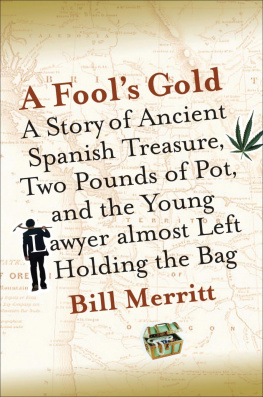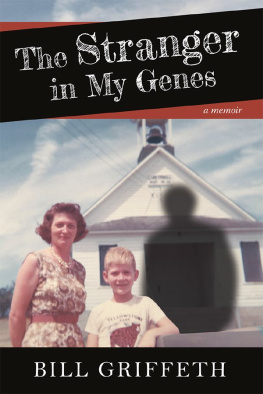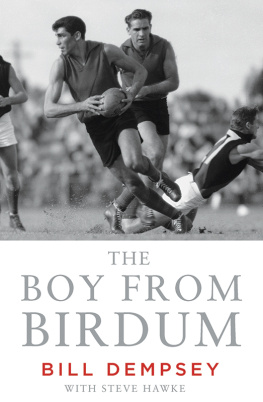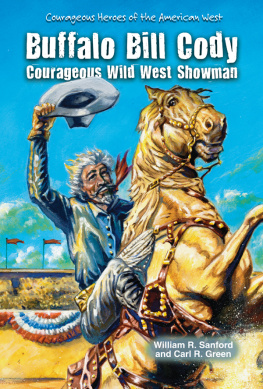A Fool's Gold
By the same author
Where the Rivers Ran Backward
A Fool's Gold
A Story of Ancient Spanish Treasure, Two Pounds of Pot,
and the Young Lawyer Almost Left Holding the Bag
Bill Merritt
BLOOMSBURY
Author's note: This book isn't journalism. It is filled with made-up individuals, composite characters, and descriptions that do not match anything in the real world. If you think something in here is about you, it isn't. And, if you think you are going to make a big deal out of it, I've got plenty more on you that doesn't appear in the book, so think again.
Copyright 2006 by William Merritt
All rights reserved. No part of this book may be used or reproduced in any manner whatsoever without written permission from the publisher except in the case of brief quotations embodied in critical articles or reviews. For information address Bloomsbury Publishing, 175 Fifth Avenue, New York, NY 10010.
Published by Bloomsbury Publishing, New York and London Distributed to the trade by Holtzbrinck Publishers
All papers used by Bloomsbury Publishing are natural, recyclable products made from wood grown in well-managed forests.
The manufacturing processes conform to the environmental regulations of the country of origin.
Library of Congress Cataloging-in-Publication Data
Merritt, William E.
A fool's gold : a story of ancient Spanish treasure, two pounds of pot, and the young lawyer almost left holding the bag / William Merritt.1st U.S. ed.
p. cm.
eISBN: 978-1-59691-992-1
1. LawyersOregonBiography. 2. LawOregonAnecdotes. I. Title.
KF373.M463A3 2006
340'.092dc22
2005015770
First U.S. Edition 2006
1 3 5 7 9 10 8 6 4 2
Typeset by Palimpsest Book Production Limited,
Polmont, Stirlingshire, Scotland
Printed in the United States of America by
Quebecor World Fairfield
To Wesley with the adventuring heart. May you see all the things you hope to see, and discover others you never dreamed of. May your dreams pale in comparison to the life you live, and may you return home with lots of pictures.
CONTENTS
T HE OREGON HIGHWAY Department used to have a sign at the foot of Neahkahnie Mountain that spelled the name phonetically: NEE-A-KAH- NEE.
They don't seem to do that anymore out of what, I suppose, is an attempt to protect the feelings of Indians by not reducing their linguistic heritage to roadside baby-talk. So, now, the only signs that spell names phonetically are on reservations, where the Indians aren't nearly as squeamish.
Oregon names are confusing because they tend to be pronounced the way a child would sound them out. It takes new residents a while to get the hang of this. Nobody east of the Rockies, for example, seems to know how to say the name of the state, stressing, as they do, the last syllable, to produce the discordant or-ree-GONE in place of the lovely ORE-ri-gun we who live here use.
Grady Jackson, a client I had for a few months over on the Coast, once told me, "You've got to pronounce Oregon names like you're just learning to read." I was fairly new to the state, then, and he had caught me trying to pronounce Yaquina with a hard q and an elongated, French kind of ee in place of the /. "Yuh-KWIN-a," he said. "Just like it's spelled." He had a theory about that, just as he had a theory about most things.
"Meriwether Lewis was a big, educated deal. He went to balls at the White House and hung out with the French ambassador, and when he came out here, he gave our rivers fancy, French names like Willamette, Now I don't mean this as a criticism of nineteenth-century public education, but the settlers didn't travel all the way across the continent because they got good grades in French.
"When they showed up out here, they held Mr. Meriwether Lewis's map up to the light and turned it this way, and that, until they had the words facin' the right direction. Then they puzzled over the spelling, trying out one thing and another, until they fetched up on wuh-LAM-ut. And, no matter what Mr. Meriwether Lewis may have had in mind, wuh-LAM-ut it has stayed ever since."
Grady may have been onto something. Like most things he told me, it was hard to tell how much truth there was to it. I'm not clear why it would even apply to Indian names, but I do know I would never have come up with NEE-A-KAH-NEE on my own.
G RADY JACKSON DIDN'T scare worth a damnwhich meant he got to live his life pretty much any way he pleased, even if the rest of us had trouble deciphering his motives.
By the time I met him, he was famous on the Oregon Coast for lots of things, including winning the Distinguished Service Cross on Guadalcanal. That had something to do with pig latin and being surrounded by Japanese soldiersI had to wait until his funeral before I got the story straight. But what Grady was most famous for was being the Crazy Man of Neahkahnie Mountain.
It was easy to see how he had gotten the reputation. He spent the last ten years of his life telling everybody within earshot about strange, marked rocks, and chests filled with gold that only he knew how to find. And he would find, too, just as soon as the State of Oregon let him back onto the beach to dig them upwhich is where the law firm of Thaddeus Silk & Assoc. came in. Paying lawyers to get permission to dig holes in a state beach seemed like an expensive way to go crazy to me, but Grady was a grown man, and as long as he had the money, Thaddeus, and then I, were more than willing to provide all the legal help he needed.
With any luck, the lawsuits could have gone on forever. When Grady got a thing into his head, it didn't come back out again. In 1940, he had been in basic training at Ft. Campbell when he'd got it into his head he wasn't going to make his bed.
"Woman's work," he told the drill sergeant. Grady might even have believed it. He was from Flat Lick, Kentucky, which sounds like the kind of place women make beds.
His drill sergeant didn't care much about reasons. He did what drill sergeants do and stood Grady at the foot of his bed, leaned into his face, and informed Private Jackson that he was going to get his ass in gear and straighten out that piece-of-shit bunk of his, NOW, Dick Brain.
And Grady did what Grady did. He said, "Woman's work."
Oddly, Grady didn't seem to mind doing all sorts of other things women do. He cheerfully mopped the floor. He washed pots in the mess hall. He sewed patches on his uniform. He scrubbed windows. But he wouldn't make his bed.
That morning, he stayed behind to work on his bed while everybody else marched off to breakfast. When everybody else came marching back, there was Private Jackson looking like trooper-of-the-month in his smartly tucked fatigues, spit-shined combat boots, and glittering brass. Only, he was a trooper-of-the-month with an unmade bunk.
From then on, the entire platoon was confined to barracksat least as far as weekend passes and trips to the commissary and the enlisted men's club were concerned. As far as forced marches and extra physical training were concerned, they weren't confined anywhere. But that didn't work, eitherat least not the way it was supposed to. The platoon didn't turn against Grady. They admired him. Grady could shoot the eye out of a gnat at four hundred meters. He could break down and reassemble an Ml carbine in less time than it took to name the parts. He was generous about helping the other guys get acquainted with their own rifles, and before long, his bed started showing up madeas crisp as any bunk anywhere.
The platoon went back to having weekend passes and beers at the enlisted men's club, and a normal schedule of marches and physical training, until the morning the drill sergeant caught a trooper from Louisville in mid-hospital corner, making Grady's bunk. That evening, while the rest of the platoon was cleaning the latrine with toothbrushes, the drill sergeant took Grady out for some individual training.
Next page









